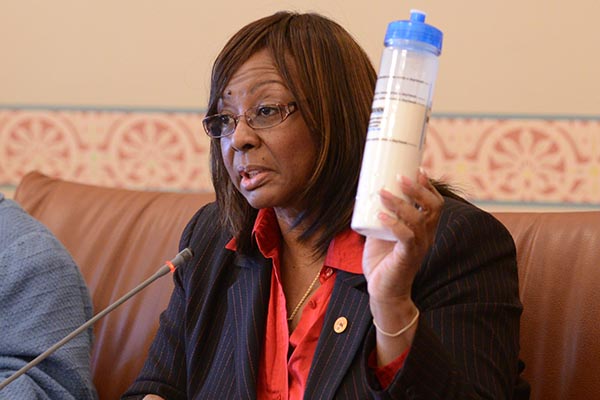 In June, the scientific journal Circulation published a new study showing that consuming sugary drinks like soda, energy drinks, fruit drinks, sports drinks and sweetened coffees and teas are linked to 25,000 American deaths per year. In light of that information, State Senate Majority Whip Mattie Hunter, (D-Chicago) is continuing to push for legislation that would place a small excise tax on sugary drinks to help fund health programs for those suffering from related illnesses and hopefully sway public opinion toward a healthier lifestyle.
In June, the scientific journal Circulation published a new study showing that consuming sugary drinks like soda, energy drinks, fruit drinks, sports drinks and sweetened coffees and teas are linked to 25,000 American deaths per year. In light of that information, State Senate Majority Whip Mattie Hunter, (D-Chicago) is continuing to push for legislation that would place a small excise tax on sugary drinks to help fund health programs for those suffering from related illnesses and hopefully sway public opinion toward a healthier lifestyle.
“This recent study shows that action in needed. This is costing people lives and costing taxpayers millions to pay for the health care,” Hunter said. “It’s only fair that the products contributing to the epidemic of diabetes, heart disease and obesity help pay the tab.”
Hunter has been the lead sponsor of The Healthy Eating Active Living (HEAL) Act in the Illinois General Assembly. Through a penny-per-ounce tax on sugary drinks, the HEAL Act would generate nearly $600 million annually to fund health care programs and invest in community programs to educate children and families about eating healthier and the long-term consequences of a bad diet.
As outlined in the HEAL Act, funding would create a Wellness Fund to restore cuts and fund prevention in Medicaid, and invest in prevention initiatives across the state, with at least 50 percent of the prevention funds going to the highest need communities. Community groups, schools, municipalities and health departments would work together to improve nutrition and physical activity. Examples of such programs could include “double-bucks” coupons for LINK recipients at farmers markets, building walking and biking paths in underserved communities, creating safer parks for kids to play and providing healthier school lunches and better physical education to school children.
In addition to the Circulation study, Senator Hunter pointed to preliminary results from a study published in the American Journal of Preventive Medicine that found that an excise tax on sugar-sweetened beverages is one of the most effective and efficient approaches to lowering children’s body mass index.
In May, a public opinion poll found that the sugary drink tax dedicated to funding health programs is popular throughout Illinois. Hunter said it reflects on people’s growing understanding of the proven and unique health hazards posed by sugary drinks and the need to promote healthy nutrition and physical activity to stem the epidemic of diabetes and heart disease.
To learn more, please visit www.HEALtheBudget.org.

